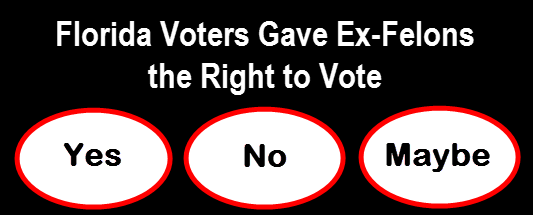Florida Voters Restored Ex-Felon's Voting Rights, But Did They Mean to Include a 'Poll Tax'?
Posted March 27, 2019 07:50 am

TALLAHASSEE – The Senate Criminal Justice Subcommittee approved its own version of the "enacting legislation" Gov. Ron DeSantis and Republican legislators say is necessary to implement Amendment 4, the constitutional measure restoring ex-felons' voting rights that 65 percent of voters approved in November.
Senate Panel Bill 7086, sponsored by Sen. Keith Perry, R-Gainesville, was approved in a 3-2 partisan vote on Monday. It could now potentially be placed on the floor for a chamber vote.
Like House Bill 7089, a House "enacting" measure that emerged last week, SB 7086 requires ex-felons to pay back all court fees and fines, in addition to restitution costs, before being eligible to vote.
HB 7089, approved by House Criminal Justice Subcommittee on March 19 in a 10-5 party line vote as PCB CRJ 19-03, requires ex-felons to also pay all court fees and fines before being allowed back into the ballot box.
CRJ 19-03 has been introduced as HB 7089 and referred to the House's State Affairs and Judiciary committees. Both meet Thursday.
The provision in both bills has drawn heated criticism by a wide range of opponents, calling it a "poll tax" on former felons seeking to become "returning citizens" by broadening the "end of sentence" to include all court costs, fees and other financial obligations, including drug tests and civil liens.
Perry told the Senate Criminal Justice Subcommittee Monday that the Legislature has to clarify that "completion of sentence" means not just prison time, probation time, parole time, community service and other actions, but completion of financial obligations imposed by courts.
Perry said the Legislature has no choice but to include completing fines, fees and restitution as a condition of eligibility in SB 7086 because arguments made before the Florida Supreme Court by Amendment 4 sponsor, the Florida Rights Restoration Coalition, agreed that such requirements would be included in defining the completion of a felon's sentence.
SB 7086 does allow ex-felons to vote if their court fees and crimes can be converted to a civil lien, Sen. Jeff Brandes, R-St. Petersburg, explained in sponsoring an amendment incorporated into the bill.
Sen. Randolph Bracy, D-Orlando, said the constitutional amendment approved by nearly 65 percent of voters doesn't mention completing financial obligations before having voting rights restored.
"In the written constitutional amendment, it does not say financial obligations have to be completed. So I don't think we're violating that language," Bracy said. "But, for me, I feel like we are essentially telling these folks that they will never be able to vote."
The League of Women Voters of Florida in a statement called adoption of SB 7086 "an attempt at voter suppression" and the American Civil Liberties Union of Florida in a statement Monday said the bill will "undermine the will of Florida voters" who passed Amendment 4.
Amendment 4 could allow an estimated 1.4 million ex-felons to be eligible to vote, as long as they've completed their sentence and weren't convicted of murder or a felony sexual offense.
But in addition to debating what it means to complete someone's sentence, senators have been debating over what "murder" means and what a "sexual offense."
Much of Monday's SB 7086 discussion involved whether being convicted of attempted murder should disqualify an ex-felon from voting.
Bracy submitted an amendment to remove "attempted murder" from crimes that preclude ex-felons from being allowed to vote.
"I believe the language clearly says 'murder,' so I think 'attempted murder' falls outside of the purview of the constitutional amendment," Bracy said. "So, whether I agree with it, you agree with it, Chair Perry disagrees with it, I still think were coloring outside of the lines on this issue."
Brandes says he thinks excluding those convicted of attempted murder was the voter's intent in adopting the constitutional measure.
If someone were to beat or purposely injure someone "and then be charged with attempted murder and be convicted of attempted murder? That that individual should have the right to vote?" Brandes asked. "To me, just philosophically, just goes against what I believe the voters actually intended."
Brandes said SB 7086 resolves questions regarding what, exactly, constitutes a "sex crime" as a felony offense that leads to a person being registered as a sexual offender.
-------------------------------
This piece appeared in the Watchdog.org and was reprinted by the Columbia County Observer with permission or license.
Layout and graphic added by the Observer; graphic by the Observer

 By
John Haughey
By
John Haughey